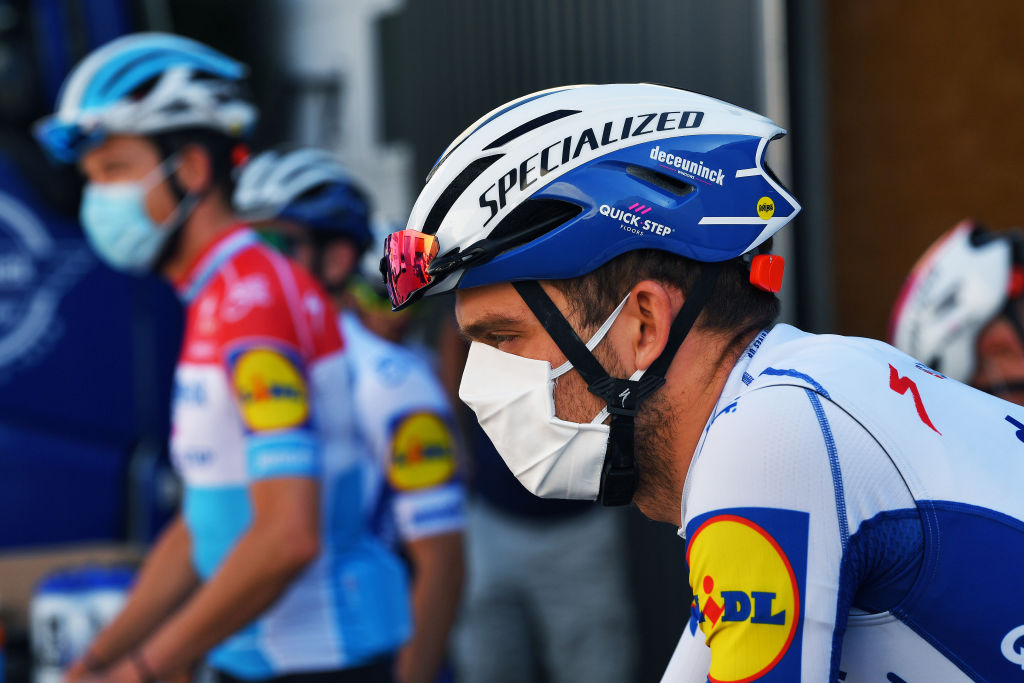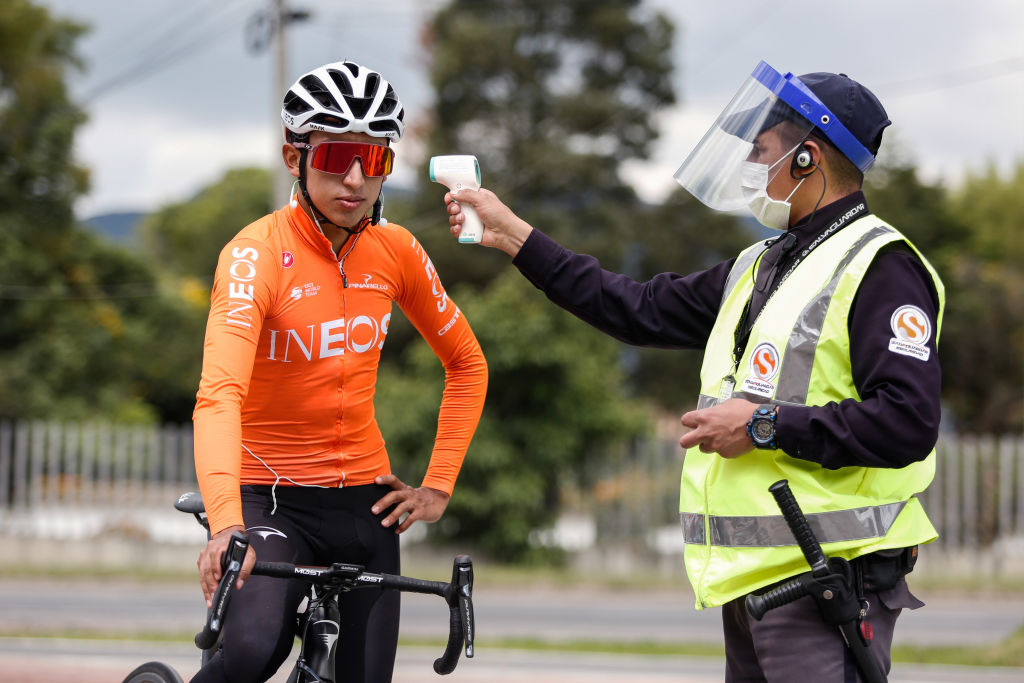What happens if a rider catches COVID-19 during a race?
Team doctors unsure as UCI defers to local medical protocols

With less than a month until the return to international racing, teams and their medical staff are still unsure about how some aspects of the UCI medical procedures can be correctly applied and are awaiting final information on what happens if a COVID-19 coronavirus case emerges during a race.
The UCI has published a 13-page document called the 're-opening of the road cycling season in the context of the coronavirus pandemic', created by UCI Medical Director Professor Xavier Bigard, team and rider representatives, and several team doctors. It includes information on pre-race risk assessments, the creation of team and peloton protective bubbles, pre-race testing for COVID-19, and social distancing.
However, there are only four lines on what happens if a suspected COVID-19 case arises amongst a team or in the peloton itself.
A COVID-19 case during the Tour de France could, in theory, mean the race is stopped. But for now, the UCI and race organisers have not released any procedures or protocols on what would happen, simply stating: "Management of clinical cases will be carried out in agreement with the local health service and in accordance with WHO guidelines."
One highly regarded and experienced team doctor told Cyclingnews that Professor Bigard has said that races would not automatically be stopped in the case of a COVID-19 positive.
Suggestions have included withdrawing and isolating the individual rider or staff member, or even withdrawing the team in question from the race. It is unclear how the other riders and teams would react to that decision.
Each race organiser has to inform the teams of the specific rules for their country two weeks before the race starts, but the clock is ticking.
Get The Leadout Newsletter
The latest race content, interviews, features, reviews and expert buying guides, direct to your inbox!
The Sibiu Cycling Tour in Romania starts on July 23, the Vuelta a Burgos in Spain on July 28, while the men's and women's WorldTour begins with Strade Bianche on August 1. The Tour de France is less than two months away.
Cycling's 'bubble' bigger than other sports
In France, a strict 14-day quarantine is still obligatory for anyone coming into contact with a suspected COVID-19 carrier, while Italy has recently adopted a softer rule for professional sport to ensure the Serie A soccer matches could start again, with teams tested for COVID-19 but allowed to continue playing matches if all the tests are negative.
A football bubble includes 30 or so players and perhaps 20 staff. A cycling bubble would include up to 176 riders and approximately 200 team staff across 22 teams, not to mention race officials. If a COVID-19 cases emerges in a major bike race, it would be difficult to test them all in time to start the next day's stage.
Yet, for now, the UCI has not issued any detailed procedures on how it will deal with a suspected COVID-19 case at a race. The UCI had to still to provide further information or reaction at the time of publication.

"I hope there won't be any COVID-19 cases in races but there could be," a team doctor, who preferred not to be identified, told Cyclingnews.
"We're different to other sports, were not like football, the team bubble and peloton bubbles are a lot bigger. The UCI says it'll decide based on the medical protocols of each country and the race organisers have to tell us two weeks before, but that makes things very complicated. One race could be stopped and other could in theory be allowed to go on.
"Teams will be racing in Spain, then in Italy, France, Belgium and elsewhere. Professor Bigard and everyone else involved have worked hard on the protocols, but I think we need to know procedures for each possible scenario when it comes to suspected cases. It is the most important of all. The riders and teams need to know what they could face as soon as possible."
Teams scrambling to find private testing labs
Teams are also trying to respect the UCI protocol on pre-race COVID-19 testing. Riders must undergo a RT-PCR nose/throat swab test in the 10 days before travelling to a race and another one at least 72 hours before the race. However, in some countries, RT-PCR swab tests can only done by public heath services if there is a suspected COVID-19 case or if someone is showing symptoms.
Grand Tours are likely to create mobile test units for the obligatory testing on rest days but teams are scrambling to find private testing labs near the races or near riders' homes across Europe. Riders may have to travel to races two or three days in advance to ensure they are tested.
Without a test result, riders will not be allowed to race. This could impact the team selection and the travel plans of riders and teams in the final days before a race.
"It's complicated, and the tests don’t offer a 100 per cent guarantee because people can catch the virus after their tests and it takes several days for the virus to develop but we've got to do something to help create the protective bubble around the teams," the team doctor told Cyclingnews.
"There's no such thing as zero risk; that's impossible. Science and mathematics are two very different things. We've got to be prudent and protective and so tests can help that. But it adds another complication to it all.
"It's giving the team doctors and team managers some sleepless nights but we're all trying to do what we can to ensure everyone is safe and the races can go on. But as the days count down to the first races, there are still a lot of things to understand."

Stephen is one of the most experienced member of the Cyclingnews team, having reported on professional cycling since 1994. He has been Head of News at Cyclingnews since 2022, before which he held the position of European editor since 2012 and previously worked for Reuters, Shift Active Media, and CyclingWeekly, among other publications.